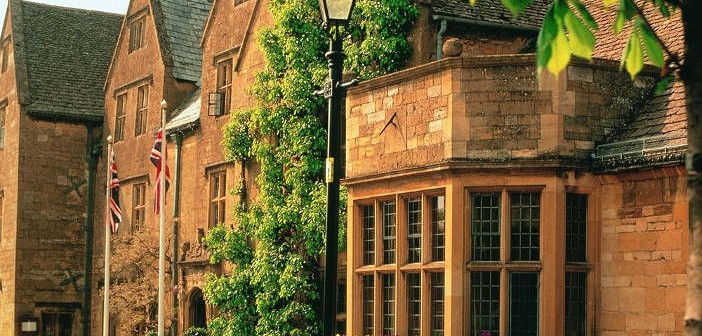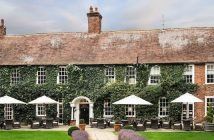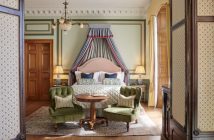It was with more than a little sentimentality that I took my mother off for a girls’ night away to The Lygon Arms in the idyllic Cotswold town of Broadway. Once a bustling 16thcentury coaching inn known as the White Hart Inn, established in 1532 by the Whyte family, General William Lygon, who served under the Duke of Wellington at the Battle of Waterloo, purchased the land on which it stood in 1820 and later made his butler, Charles Drury, manager, who changed the Inn’s name to The Lygon Arms in tribute to his master.
The hotel continues to charm everyone who visits with its maze of oak-panelled snug rooms leading off the entrance hall and featuring tapestries, ancestral portraits and inglenook fireplaces, perfect for lovers hoping for a quiet moment. Whilst several of the Lygon Arms’ 78 bedrooms and 6 suites date back to when Henry VIII was on the throne, in the not so distant past my father invited my mother here for their first romantic dinner out. I was a mere twinkle in his eye, so I have a lot to thank the hotel for – had the experience been any less memorable it’s quite possible that I might not be here now. Had the hotel been any less glorious, revisiting after all those years might have been like opening Pandora’s Box.
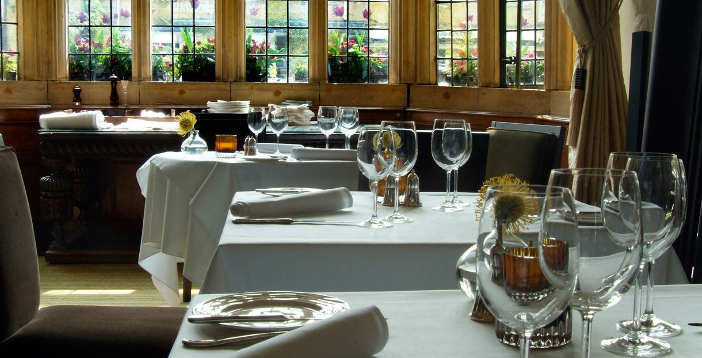
Once part of the Savoy Group, The Lygon Arms now belongs to The Hotel Collection, who not only gave many of the rooms an immaculate refurbishment, but also earmarked a select number to remain in a style reflective of the building’s true character. Oliver Cromwell, who became Lord Protector of England in 1653, stayed here on 2nd September 1651, the night before the Battle of Worcester, the final and decisive battle of the Civil War, fought between King Charles I’s ‘Cavaliers’ and Parliament’s ‘Roundheads’. You wouldn’t have caught Cromwell relaxing in the Spa.
I was hoping for a room harking back to those days of yore, and thankfully I was shown to The Great Chamber, a junior suite resembling something out of an historical novel. I turned the key (complete with the heaviest looking wooden fob I have ever seen) in the lock of an oak latch door, to be greeted with an incredibly high vaulted-ceilinged room, impressive wooden beams, heavy and suitably ancient-looking oak furniture and reassuringly creaky wooden floorboards. This sparse Tudor-chic was combined with a luxury modern bathroom ensuring the best of both worlds.
The hotel also offers two entirely different dining experiences; Luke’s Broadway with its modern brasserie classics and The Great Hall with its formal fine dining menu, where my father reserved a table back in 1983. Today, it continues to impress every diner with its high barrel-vaulted ceiling, impeccably white starched table linen (complete with napkin crowns), and classical cuisine entirely in-keeping with the environment. M recalled the table she and my father had dined at with a faint tear in her eye, fondly reliving being courted in such grand surroundings. The many couples still enjoying a romantic evening proved that nothing much had changed.
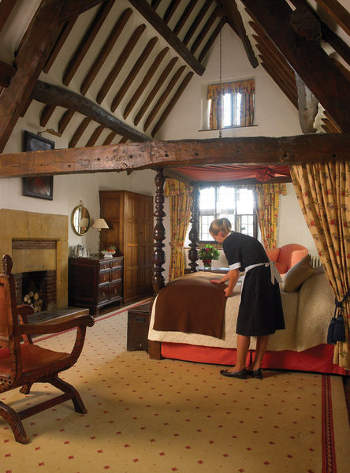
The next day M and I strolled the length of the high street for a good old mosey – few high streets offering such a good opportunity as Broadway for the pastime of ‘moseying’, from ‘country outfitters’ selling thick socks of muted colours and Wellington boots which seemed to scoff at M for wearing heels to the Cotswolds, to gift shops full of nonsense and postcards and food delicatessens selling local produce, ideal for assembling spontaneous picnics. When he isn’t spending time behind bars, you may have the misfortune of bumping into some-time resident, Max Clifford, purchasing his groceries.
When browsing gets tiring enjoy a cream tea in Tisanes tea room before taking in the exhibits of the Ashmolean Museum (sister to the prestigious Oxford branch), some world-class theatre at the RSC, Stratford-Upon-Avon, (an extremely scenic 30 minute drive away), or visit Hidcote Manor in Chipping Camden where Lawrence Johnson, the keen American horticulturist devoted years of his life to creating a spectacular setting reminiscent of The Secret-Garden.
Whatever the season, there is much to keep you entertained during a weekend in Broadway. The town’s annual arts festival, founded in 2012 is also establishing itself as a notable cultural event in May, and earlier this year paid homage to the artist, John Singer Sargent, who visited a friend at Farnham House on Broadway’s village green in 1885, where he created one of his most famous works, Carnation, Lily, Lily, Rose. Every day, after playing tennis, Sargent would bolt across the lawn to work on the portrait of two little girls, Polly and Dorothy, in which he longed to capture the beauty of the Cotswold twilight and the glow emanating from the girls’ Chinese lanterns. So much trouble did he take over the picture, he later proclaimed it ‘Damnation, Silly, Silly, Pose.’
Since being ‘discovered’ by William Morris, Broadway continued to be the haunt of artistic circles from The Broadway Group of Artists to authors such as J.M. Barrie and Evelyn Waugh, and the English composer, Ralph Vaughan Williams. Today, The Lygon Arms remains the focal point of a truly remarkable town which provides an unmatched and timeless beauty. For M it had been like revisiting an old friend.

